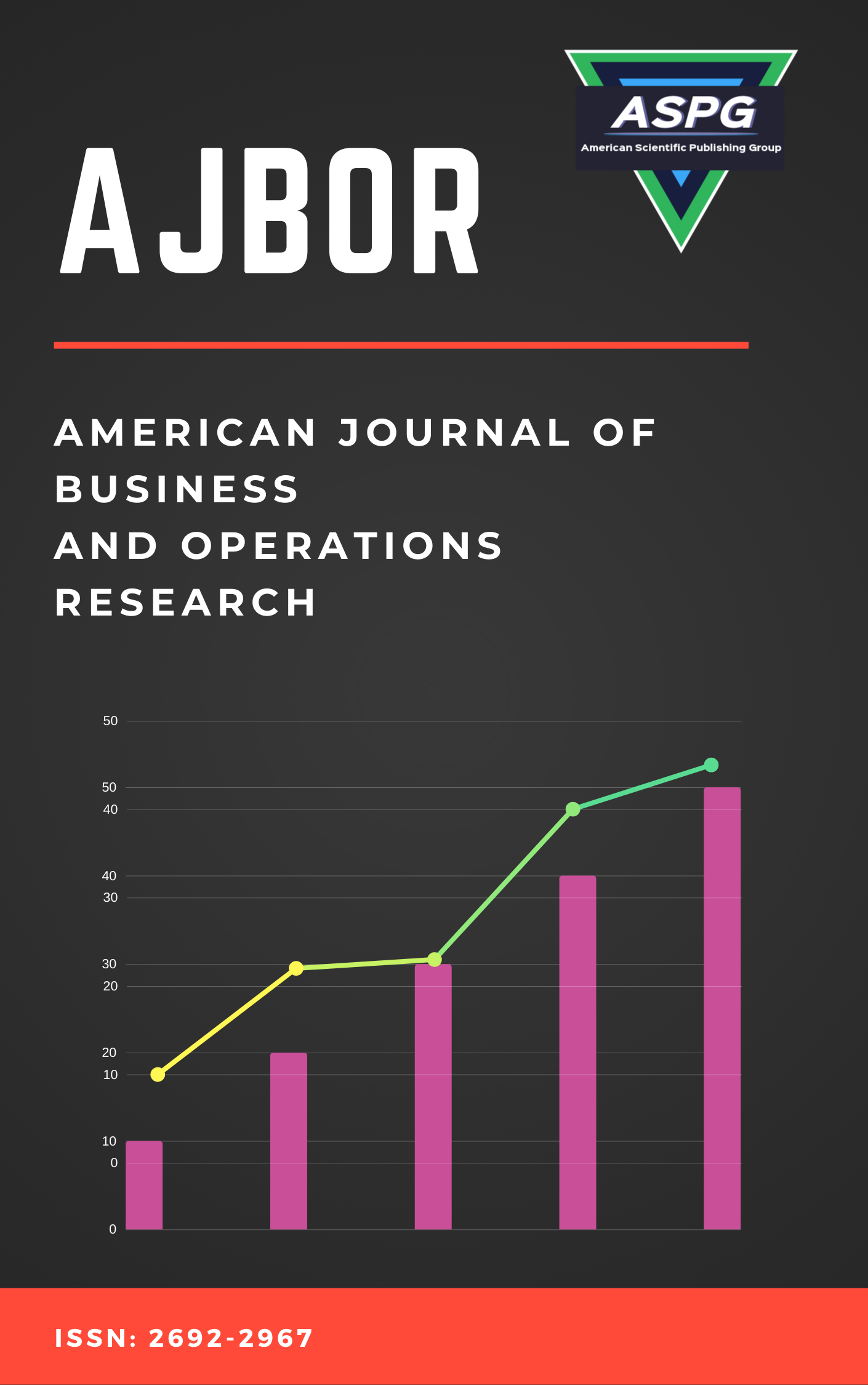

Volume 2 , Issue 2 , PP: 73-81, 2021 | Cite this article as | XML | Html | PDF | Full Length Article
Mona Mohamed 1 *
Doi: https://doi.org/10.54216/AJBOR.020201
The onset of the information technology revolution, economic globalization, and high customer expectations have all contributed to significant developments in businesses supply chain management (SCM). Due to the plethora of data generated throughout the entire supply chain has transformed how SCM analysis is conducted. Also, Retailers, in particular face the challenge of managing SC effectively to meet customer demands while reducing costs. Herein, we suggest an approach to optimize SCM using retail analysis techniques. As one of the most well-known artificial intelligences (AI) approaches and machine learning (ML) applications in SCM are the main goals of this study. By constructing conceptual framework, data analytics, ML, and optimization techniques are integrated to generate Intelligent Support Techniques (ISTs) for analyzing SC data and identify opportunities for improvement. We apply retail analysis techniques such as demand forecasting, inventory management, and assortment planning to optimize supply chain operations. The efficiency of our ISTs verified through employing it in a real-world case study of a large retail chain. Our results show that the suggested ISTs can lead to significant improvements in supply chain performance, including increased sales, reduced inventory costs, and improved customer satisfaction.
supply chain management (SCM) , artificial intelligences (AI) , Intelligent Support Techniques (ISTs) , machine learning (ML) , and optimization techniques
[1] K. Zhou, T. Liu, and L. Zhou, “Industry 4.0: Towards future industrial opportunities and challenges,” in 2015 12th International conference on fuzzy systems and knowledge discovery (FSKD), 2015, pp. 2147–2152.
[2] Y. Duan, J. S. Edwards, and Y. K. Dwivedi, “Artificial intelligence for decision making in the era of Big Data–evolution, challenges and research agenda,” Int. J. Inf. Manage., vol. 48, pp. 63–71, 2019.
[3] G. F. Luger, “Artificial Intelligence: Structures and Strategies for Complex Problem Solving, 4th edn, Harlow, Essex, England.” Addison Wesley, Person Education Limited, 2002.
[4] D. D. Miller and E. W. Brown, “Artificial intelligence in medical practice: the question to the answer?,” Am. J. Med., vol. 131, no. 2, pp. 129–133, 2018.
[5] A. M. Aamer, L. P. E. Yani, and I. M. A. Priyatna, “Data analytics in the supply chain management: Review of machine learning applications in demand forecasting,” Oper. Supply Chain Manag., vol. 14, no. 1, pp. 1–13, 2021, doi: 10.31387/oscm0440281.
[6] S. Tiwari, H.-M. Wee, and Y. Daryanto, “Big data analytics in supply chain management between 2010 and 2016: Insights to industries,” Comput. Ind. Eng., vol. 115, pp. 319–330, 2018.
[7] R. Carbonneau, K. Laframboise, and R. Vahidov, “Application of machine learning techniques for supply chain demand forecasting,” Eur. J. Oper. Res., vol. 184, no. 3, pp. 1140–1154, 2008.
[8] L. P. E. Yani, I. M. A. Priyatna, and A. Aamer, “Exploring machine learning applications in supply chain management,” in 9th International Conference on Operations and Supply Chain Management, 2019, pp. 161–169.
[9] B. Biggio and F. Roli, “Wild patterns: Ten years after the rise of adversarial machine learning,” in Proceedings of the 2018 ACM SIGSAC Conference on Computer and Communications Security, 2018, pp. 2154–2156.
[10] A. Diez-Olivan, J. Del Ser, D. Galar, and B. Sierra, “Data fusion and machine learning for industrial prognosis: Trends and perspectives towards Industry 4.0,” Inf. Fusion, vol. 50, pp. 92–111, 2019.
[11] G. Baryannis, S. Validi, S. Dani, and G. Antoniou, “Supply chain risk management and artificial intelligence: state of the art and future research directions,” Int. J. Prod. Res., vol. 57, no. 7, pp. 2179–2202, 2019.
[12] T. Choi, S. W. Wallace, and Y. Wang, “Big data analytics in operations management,” Prod. Oper. Manag., vol. 27, no. 10, pp. 1868–1883, 2018.
[13] H. Sarimveis, P. Patrinos, C. D. Tarantilis, and C. T. Kiranoudis, “Dynamic modeling and control of supply chain systems: A review,” Comput. Oper. Res., vol. 35, no. 11, pp. 3530–3561, 2008.
[14] S. Sun, Z. Cao, H. Zhu, and J. Zhao, “A survey of optimization methods from a machine learning perspective,” IEEE Trans. Cybern., vol. 50, no. 8, pp. 3668–3681, 2019.
[15] M. S. Fox, M. Barbuceanu, and R. Teigen, “Agent-oriented supply-chain management,” Information-Based Manuf. Technol. Strateg. Ind. Appl., pp. 81–104, 2001.
[16] H. Treiblmaier, “The impact of the blockchain on the supply chain: a theory-based research framework and a call for action,” Supply Chain Manag. an Int. J., vol. 23, no. 6, pp. 545–559, 2018.
[17] G. Büyüközkan and F. Göçer, “Digital Supply Chain: Literature review and a proposed framework for future research,” Comput. Ind., vol. 97, pp. 157–177, 2018.
[18] X. Mou, “Artificial intelligence: investment trends and selected industry uses,” Int. Financ. Corp., vol. 8, 2019.
[19] M. P. De Brito, V. Carbone, and C. M. Blanquart, “Towards a sustainable fashion retail supply chain in Europe: Organisation and performance,” Int. J. Prod. Econ., vol. 114, no. 2, pp. 534–553, 2008.
[20] D. Kannan, R. Khodaverdi, L. Olfat, A. Jafarian, and A. Diabat, “Integrated fuzzy multi criteria decision making method and multi-objective programming approach for supplier selection and order allocation in a green supply chain,” J. Clean. Prod., vol. 47, pp. 355–367, 2013.
[21] G. Perboli, S. Musso, and M. Rosano, “Blockchain in logistics and supply chain: A lean approach for designing real-world use cases,” Ieee Access, vol. 6, pp. 62018–62028, 2018.